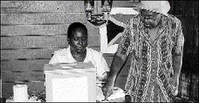Accountability and equity in public office
Published: Sunday | June 14, 2009

Thompson
One of the critical ingredients of effective and transformative leadership is accountability. In contexts where employees are not held accountable the organisation perishes. Accountability is one of the cornerstones of an organisation that operates with a clearly defined vision.
Estimates put the cost of running the upcoming (and recently held) by-elections at nearly $1 billion, inclusive of direct state expenditure to run the electoral process and the support from other sources to finance various campaign activities. That's a lot of money. These figures do not include the legal fees for lawyers who will represent (and have represented) clients in court cases related to dual citizenship.
The law and the Constitution must be upheld and thus the elections have become necessary. But how did we get here, and who is responsible?
In running a business or a government institution there is a functionary called the accountable officer whose responsibility normally includes that of ensuring that due care is exercised in the taking of decisions so that costly errors do not occur.
That as many as a possible six members of parliament were or are ineligible to sit in the House of Representative means that an accountable officer somewhere might have been derelict in his/her duty. Would such an officer be guilty of malfeasance - an act that is wrongful and may be criminal; misfeasance - an act that is not illegal but is improperly performed; or nonfeasance - a failure to act which results in injury?
Without the process of a trial to establish criminal intent or action I would not be prepared to argue that malfeasance occurred in the failure of the Electoral Commission of Jamaica to prevent non-eligible persons from being nominated in 2007 (but it may be a helpful thing if proceedings were commenced to determine if this were the case). I am prepared to argue, however, that either misfeasance or nonfeasance occurred. What is the evidence?
Six members of the legislature could have been placed there improperly. There are at least two cases of which we are now sure. These two persons, and possibly others, were involved in the making of laws for which they were not legally empowered by virtue of their status. The country has been put through a tedious process of avoidable expenses running into millions of dollars of taxpayers' money. Is not someone responsible for this?
leaders are accountable

A voter dips her finger in ink after casting her vote.
While it is reasonable to argue that each contesting MP must ensure that he/she is eligible and each party's leadership must ensure that the people they nominate are qualified, the ultimate responsibility for certifying the eligibility status of a candidate must be someone other than the candidate and other than the contesting party.
I hold no personal grudge for Danville Walker (former director of elections) under whose watch these questionable nominations occurred. If, however, the director of elections was the accountable officer who should have ensured that a proper and legal nomination process took place, then he must be called to account. Could a private company be forced to spend millions of hard-to-get dollars and someone does not pay?
What is worse, not only was there no inquiry into the failure of the ECJ to have properly supervised and managed critical aspects of the 2007 Elections, but the CEO, having found it necessary to step aside for reasons unrelated to his assessed performance (but related to his own eligibility to hold that office) is rewarded with a job as big and well-paying (or bigger).
Jamaica can ill-afford costly blunders by senior officers, and if some are allowed to blunder and be rewarded (or not be called to account) and others are put to the sword, the country will be perpetually in a cycle of mistrust and more and more persons will become cynical of leaders.
ABSENCE OF EQUITY

Walker
If accountability is the cornerstone of a visionary organisation and society, then equity becomes the cement that holds the organisation together. In any organisation where inequity or the perception of it exists there can be little buy-in into the ideals of the organisation, and the result is chronic underperformance and severe underachievement. Jamaica seems to suffer from both underperformance and underachievement.
death of premature baby
The issue of accountability and equity came into yet another sharp focus with news that a nurse from May Pen Hospital has been suspended for her involvement in the death of a premature baby. A report on this matter carried in The Sunday Gleaner of June 7 suggests that the nurse, who was improvising in providing warmth to the infant due to the absence of an incubator, heated a substance in a microwave oven and wrapped it in a towel and placed the baby on it.
The is a common practice, I am told, in a health service starved of funds. The bag, perhaps having been overheated, burst and the baby was burnt. Maybe the suspension was the right thing, but does the same principle apply to all? I think not. It is this fact that poses one of the greatest threats to the creation of a just Jamaica.
Dr Canute Thompson is assistant vice-president at the International University of the Caribbean. He is author of the book, 'Towards Solutions: Fundamentals of Transformational Leadership in a Postmodern Era'. He may be reached at canute_thompson@hotmail.com. Feedback may also be sent to columns@gleanerjm.com.
